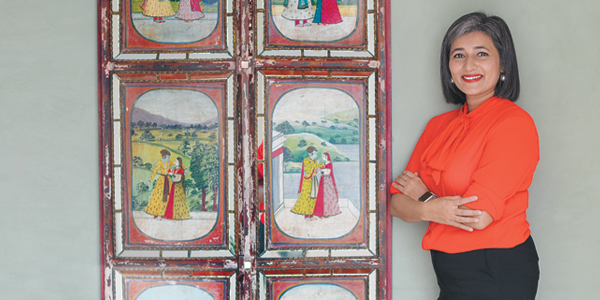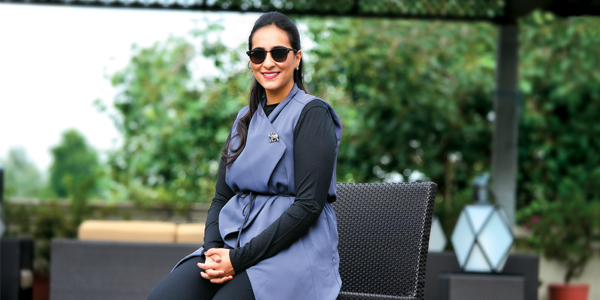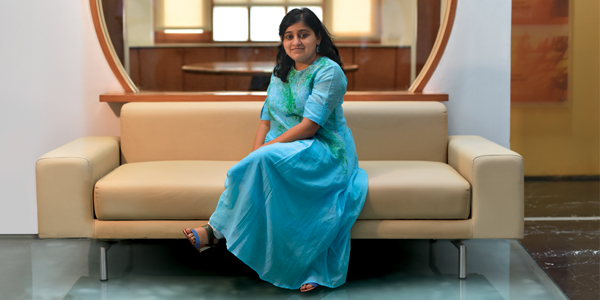How Lavanya Nalli gave a modern twist to Nalli’s nine-decade legacy
Lavanya Nalli got her legacy saree house ready for a fashion-forward world, with a few snips and tucks.
Lavanya Nalli distinctly remembers her childhood years spent at her ancestral home in Chennai. Located right above Nalli’s flagship store (opened in 1928), opposite Panagal Park, the expansive home is divided into multiple sections, with corridors that are open to the sky and a little courtyard section leading to the dining area. “There was always an organic interplay between work and family and it was very common to talk about business at the dinner table,” recalls Lavanya, 34. During one such conversation, a curious Lavanya remembers asking her grandfather, Nalli Kuppuswami Chetti, why the Nalli store has so many loyal customers. He responded that during World War 2, Madras was under threat of being bombed so most of the traders and merchants shut shop and went back to their native places. But her great grandfather, Nalli Chinnasami Chetti, had resolved to not leave the city as he believed the city needs them.
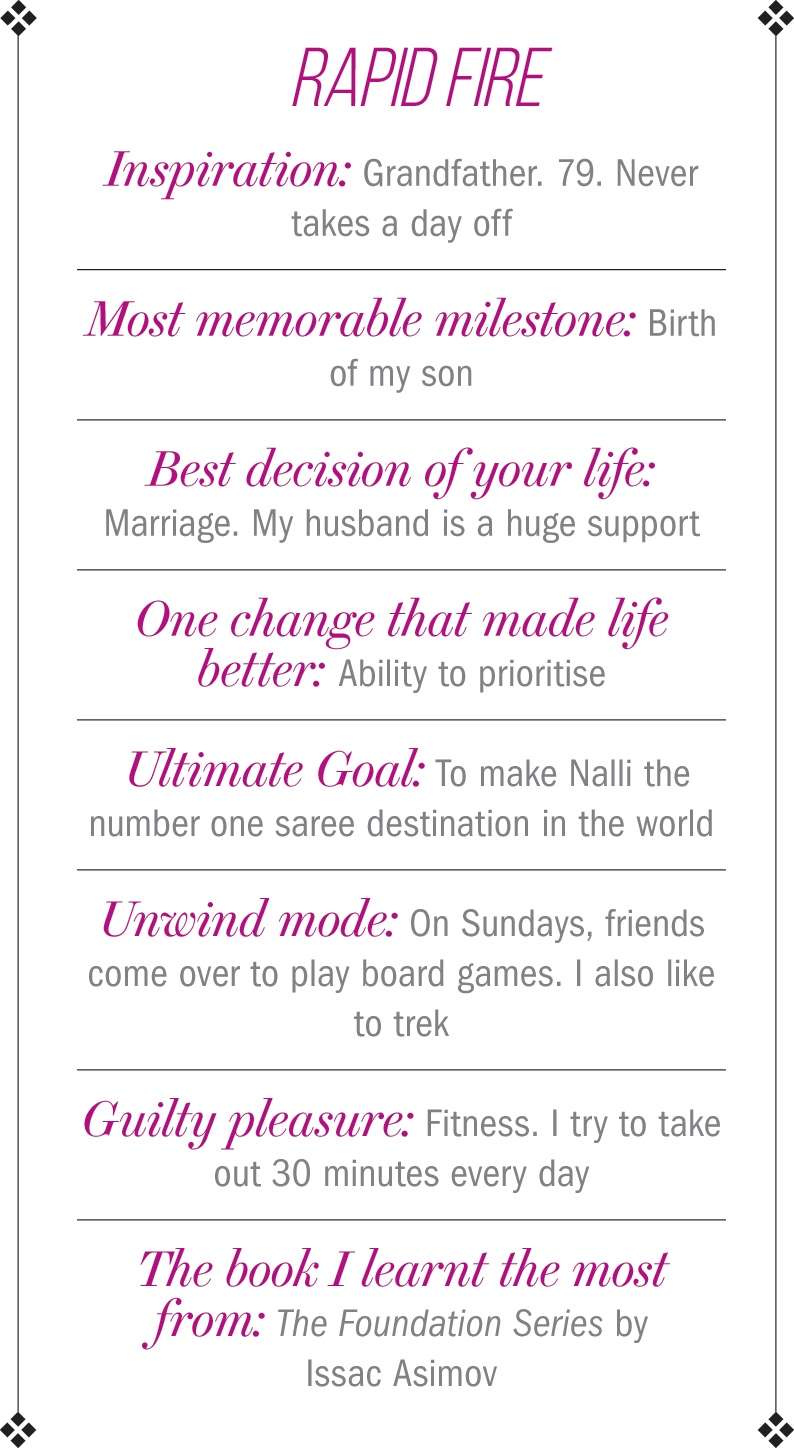 Consequently, if people had to get a towel or handkerchief, they had to come all the way to the Nalli store. “There was a lot of goodwill that we garnered at the time. Out of necessity people were forced to come to us. But those customers stayed on when they recognised the quality of the product,” says Lavanya with a smile.
Consequently, if people had to get a towel or handkerchief, they had to come all the way to the Nalli store. “There was a lot of goodwill that we garnered at the time. Out of necessity people were forced to come to us. But those customers stayed on when they recognised the quality of the product,” says Lavanya with a smile.
And it is this commitment that she carries forward as she spearheads the Rs.7 billion Nalli Silk Sarees as the vice chairperson, handling its e-commerce and private label business. Her father, Ramnath Nalli, oversees operations, exports and off-line stores while her younger brother, Niranth Nalli, handles the jewellery arm which was launched in 2012. Lavanya is the first woman in the family to join the business and has made significant contribution to scaling it up. From conceptualising the Nalli Next format that stocks a more contemporary collection and launching a private label, Etnische, to building the e-commerce business for the firm, Lavanya has added several feathers to her cap. “I want to make Nalli the number one sari destination in the world. And I think I can,” she says, with an admirable determination.
Understanding the Legacy
Growing up in the Nalli household meant she was introduced to the family business early. But while she enjoyed being on the shop floor, joining the family business was never the plan. Though she wanted to be a journalist, her father suggested she explore the science stream or engineering as she was strong in math, physics and chemistry. “I didn’t have a strong reason to say no. So I picked it up and it gave me a fairly strong, analytical approach of looking at the world. When I look back, I have no regrets,” says Lavanya.
Her first tryst with Nalli was when she joined the business as an intern, when she was in the third year of her bachelor’s in computer science at Anna University. During the three-month period, she worked on the supply chain side and was intrigued by it. She also worked in the sales, marketing and consumer side. She then continued to work at Nalli post her graduation for four years, until 2009.
During this tenure, the Nalli scion demonstrated not just her enthusiasm for work, but also an astute business mind. In addition to increasing the store count from 14 to 21, she was instrumental in significantly increasing revenues by expanding the product range and stores. She also made a key observation – that very often, customers buying their sarees were older women. Their younger companions – sister or daughter – would seldom buy one. Upon asking, they told her that ‘my mom wears these kinds of sarees. I don’t think Nalli has my style.’ Back then, younger companions would often ask for designer sarees. Immediately, Lavanya would send the sales boy and he would come back with a whole batch of designer range. Every single time, the younger companion would be surprised. “We had the products but there was a strong perception gap. Younger women feel it is too old-fashioned, like the classic Kanjeevaram sari. Breaking that perception and catering to two different generations of women in the same format was also very difficult,” she explains. While they experimented having a separate section within the store, it was eventually spun off into a separate store format called Nalli Next in 2007.
The first Nalli Next store was opened in Alwarpet in Chennai, and its success prompted them to open two more stores in Bengaluru and Mumbai. With this new format, the company went where the new age customer is — into malls and smaller formats as opposed to large standalone stores.
Venturing Out
Despite a successful stint in the business, Lavanya felt like she had hit a ceiling. There were things she didn’t know and realised that she can gain that knowledge by working outside the family business. “Established businesses would look at you strangely if you were from a family business and you still wanted to work with them. So there weren’t many opportunities except for getting an education,” says Lavanya, who then went on to pursue her MBA from Harvard University in 2009.
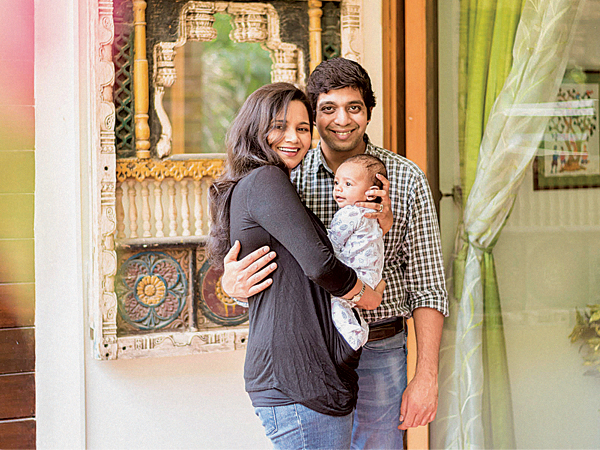
At Harvard, she met and fell in love with Abhay Gothari. The couple got married in 2011 and moved to Chicago. Gothari joined Booz Hamilton while Lavanya chose to work with McKinsey where she advised CXOs of Fortune 500 companies on issues ranging from top-line growth and profit improvement initiatives, change management programs and multi-channel strategy. “If I could think of the three formative experiences in my life, it is Nalli, Harvard, and McKinsey. I credit it for everything I have done and for shaping me into the person that I am,” she says. At McKinsey, what impressed Lavanya was the high bar they set for performance — personal and that of the firm — and its core value of ‘Client First’. And in many ways, it is quite similar to how a family business is run.
The couple moved back to India in 2014, and Gothari set up his own business in building an end-to-end integrated cold supply chain solution. Lavanya, though, still didn’t want to join the family business immediately, as she realised that the business environment here is completely different. To get more experience in the Indian context, Lavanya joined one of India’s leading fashion e-commerce start-ups, Myntra, as the vice president for revenue and shopping experience. “I had a ringside view to what happens to an organisation as they grow, how to scale and handle growth but still preserve the organisation’s culture,” she says. In 2015, she finally felt ready to take on the responsibility of furthering the family business and joined Nalli as the vice chairperson.
A New Journey
In the six years that Lavanya was away from her family business, a lot had changed. While women previously wore sarees out of habit, they now wore it out of choice and not to conform. The other shift was that customers now had higher disposable incomes and didn’t shy away from spending on themselves.
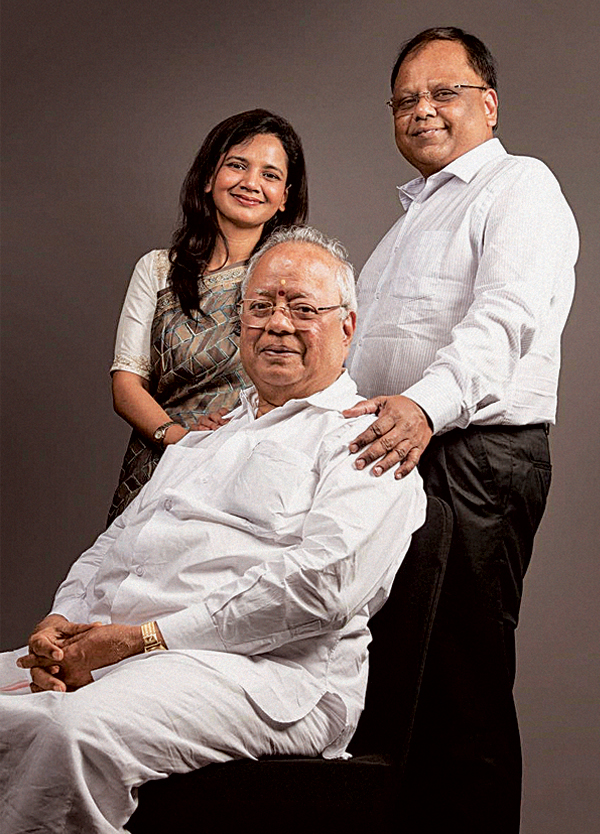
All this made the growth prospects look exciting but it was also important to adapt to the changing customer needs. While the Nalli Next format addressed a part of it, another large gap was the lack of an e-commerce presence. Lavanya didn’t want to list on other websites because she felt Nalli’s brand name was strong enough. So they decided to invest in e-commerce and make it one of their strategic channels. “Now that division is doing quite well. It has been more than doubling year on year,” she says with a smile. This despite not going down the discounting route or allowing cash on delivery and making returns possible only if there is a defect on it. Lavanya also focused on expanding the product line by introducing kurtis and palazzos under a new private label — Etnische — which was launched in 2015. Nalli is now using their e-commerce channel to add more private labels and scale up their international business. One trait she has picked up from her father and grandfather was that customers always come first. Both of them would spend most of their time on the shop floor closer to the customer rather than working at a corporate office. She recalls an incident where a customer wanted a particular sari but it was sold out. However, her grandfather went out to the next store, picked it up and gave the woman the sari. “He lost that one sale, but he has gained a consumer for life. These are the stories that stick with you,” she states.
For now, her time is divided between her son Rudra and her work. Gothari, she says, is a huge support in helping her manage both seamlessly. “The two of us tag team together. We do not curb each other in what we want to do personally or career-wise,” she says, calling him her support system at home.
She also has grand plans for expanding the business – domestically and internationally. “Right now my focus is on offline expansion,” she says. Over the past year, Nalli has opened stores in New Jersey, California and are set to open stores in Dallas, Chicago, Toronto. In India it is looking to expand in Lucknow, Pune, Indore, Nagpur, Bhubaneshwar. The goal is to double the store count in the country, from 34 to 74.
As she sets sight on newer frontiers, she admits there could always be minor setbacks. “Setbacks are a part of life. The first time you learn to drive a car, I am sure you make mistakes. But that doesn’t mean you give up driving the car,” she says. You have to focus on the destination and everything else happens seamlessly,” she signs off









